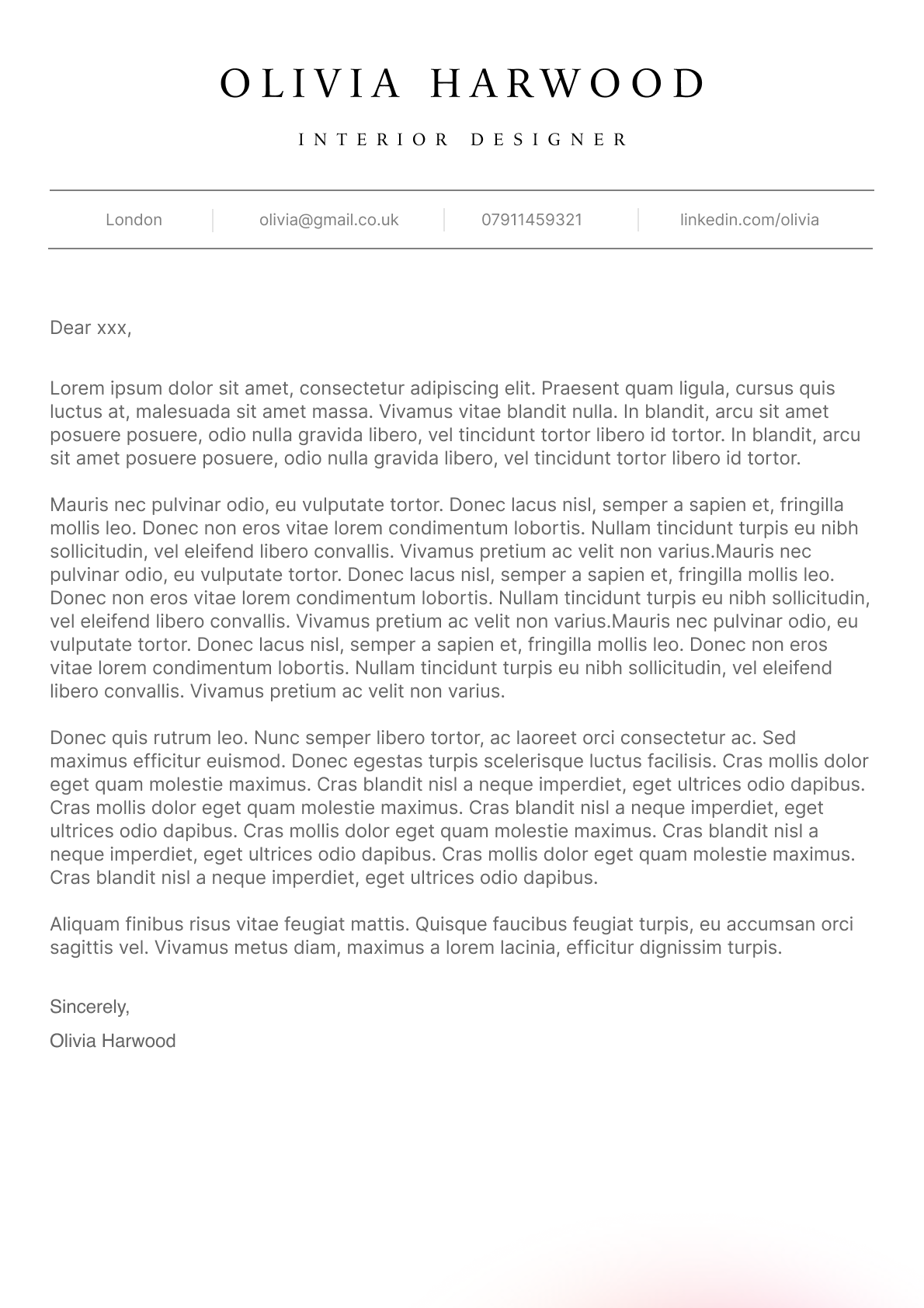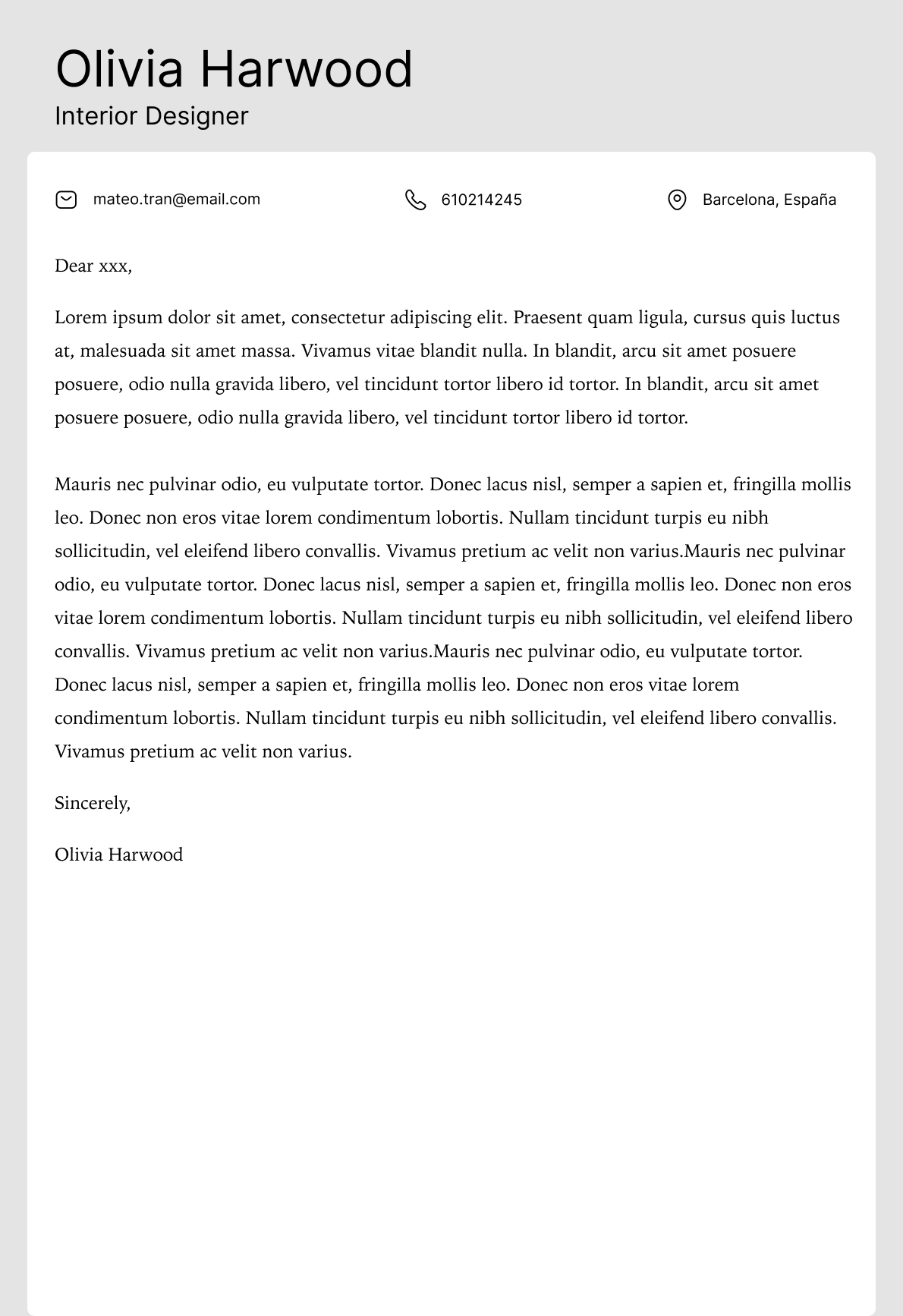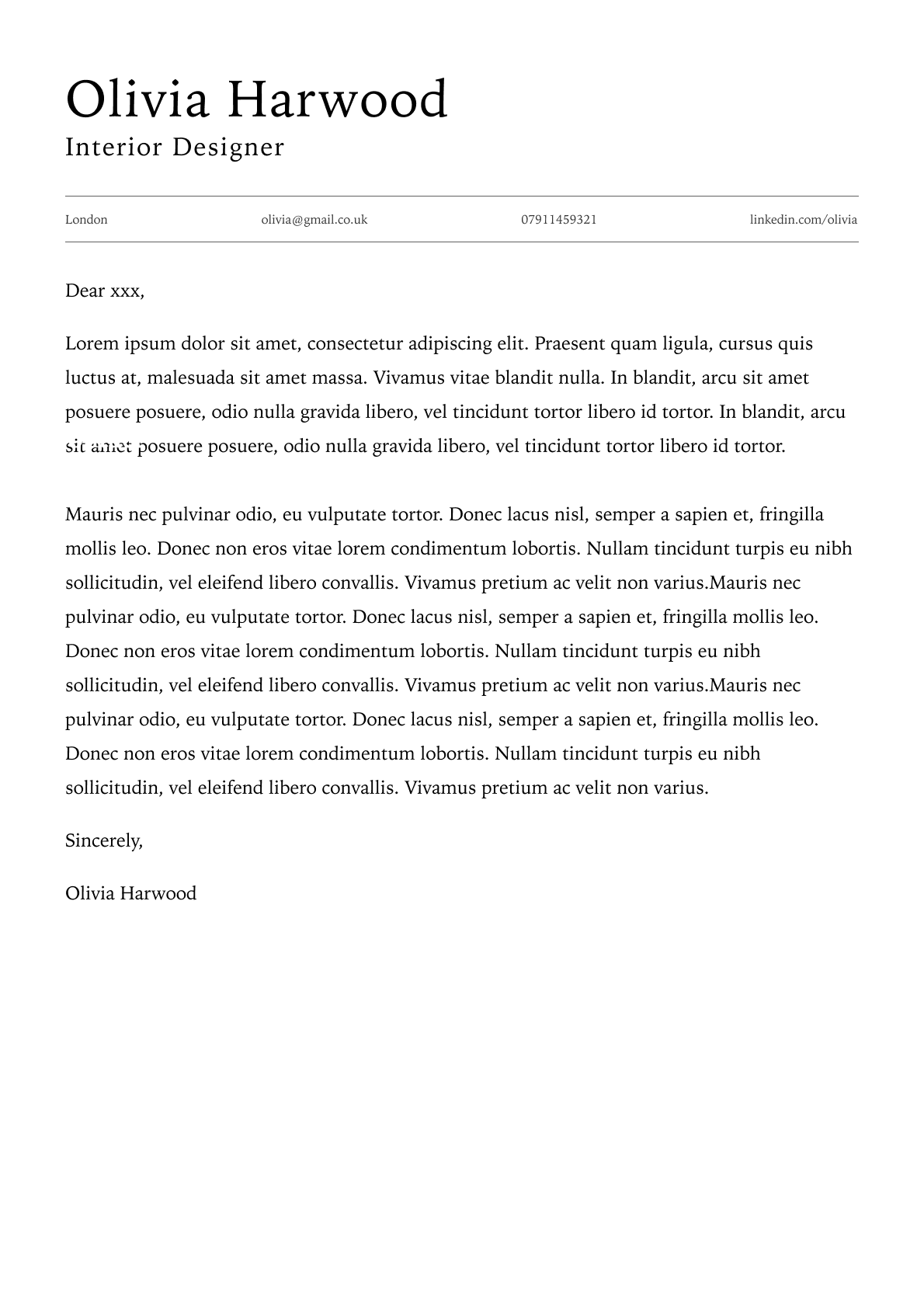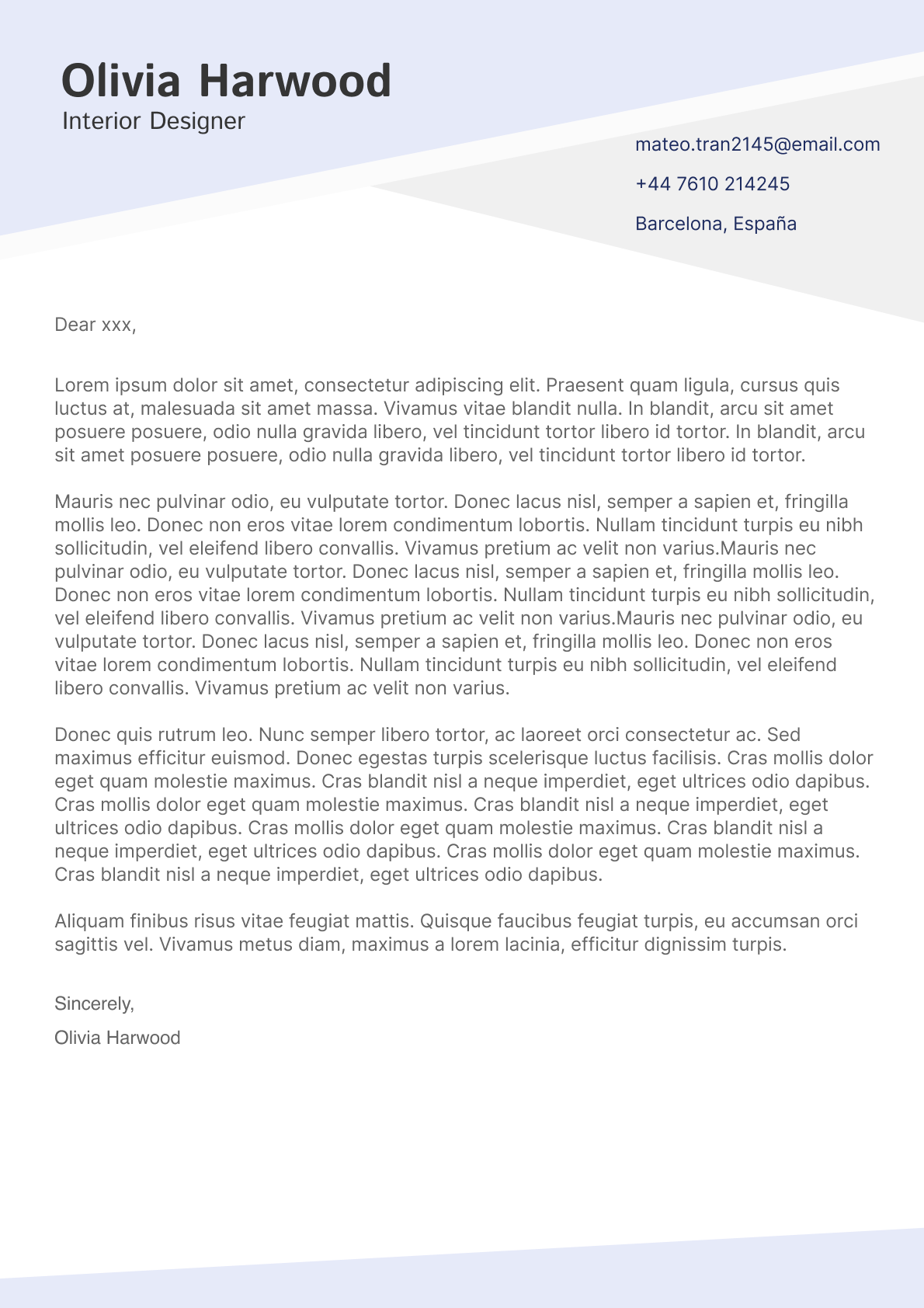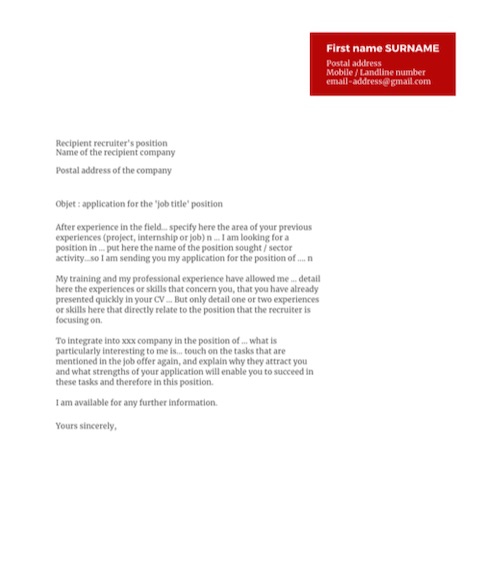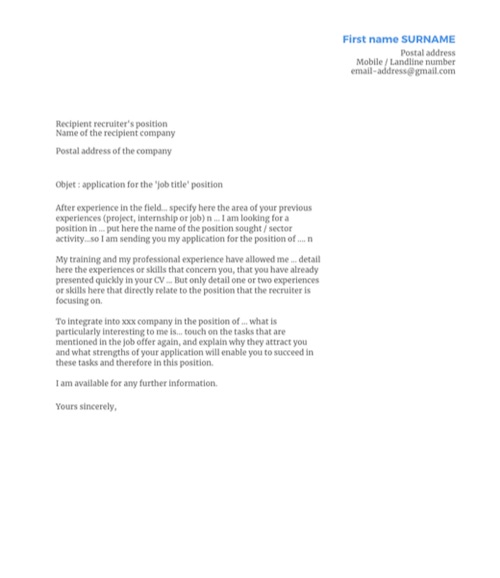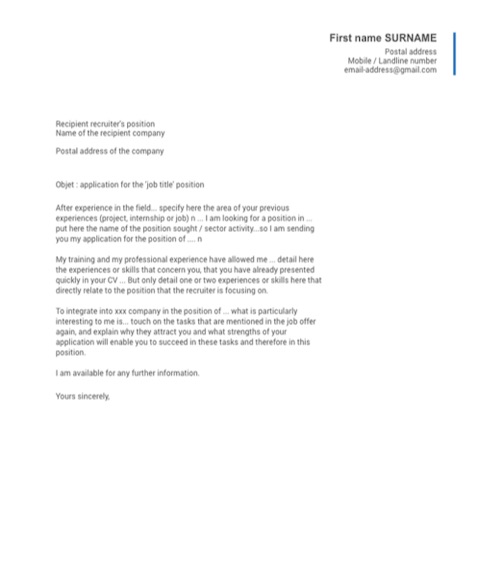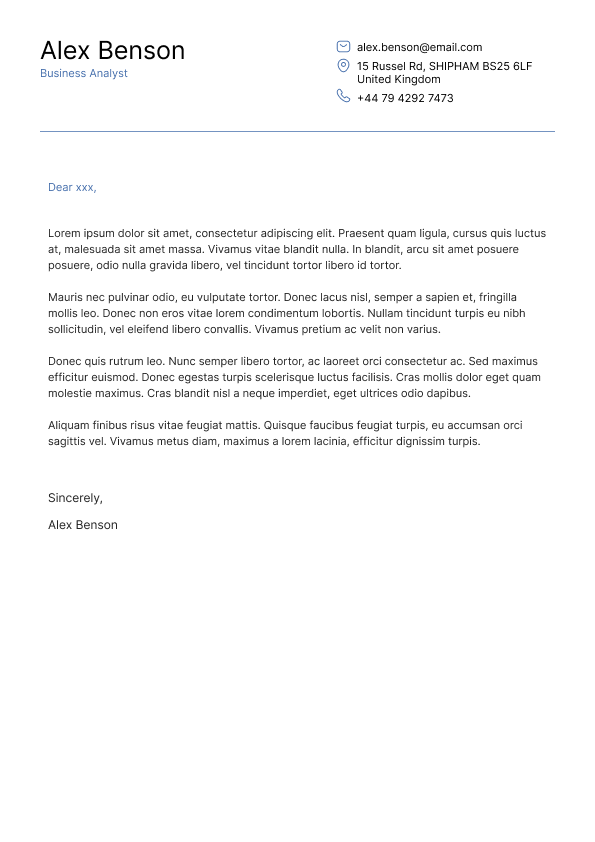Cover Letter Hub
Online Cover Letter Creator
- Choose the cover letter template
- Customize and write your cover letter
- Download your letter in PDF, TXT or Word
- Send your application to recruiters instantly
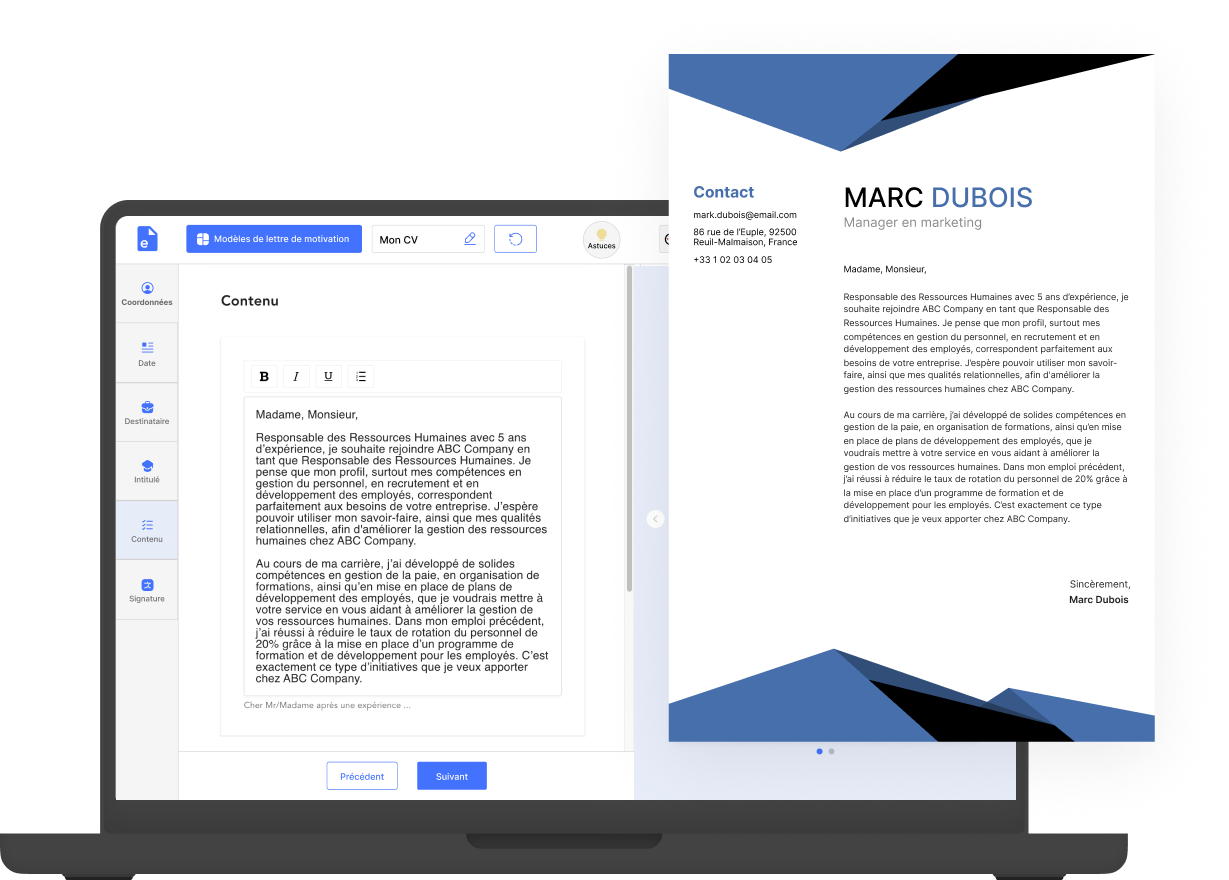
Custom Cover Letter Creator
Write an effective cover letter in just a few clicks using our templates.
Customize my letter1. Select the appropriate cover letter template
Available in different styles, industry sectors, or professions, our cover letter templates are varied to specifically meet your needs.
2. Adapt your cover letter easily
The templates are designed to personalize your cover letter in moments. You can choose to draw inspiration from the text or customize it completely.
3. Download your letter in different formats
Download your cover letter in one click in PDF, TXT, or Word format. Attach your letter to your resume and apply directly.
Choose your cover letter template
Access numerous online cover letter templates and select the one that matches your project.
Creating an effective cover letter
The cover letter is often the first impression you give to the recruiter and triggers whether they want to meet you or not. To guide you through this writing process, here are 10 tips and 5 mistakes to avoid for an effective and convincing cover letter.

Cover letter characteristics
To pass the first selection stage, working on your letter is a crucial exercise. When writing, you must demonstrate your motivation and prove that you are the ideal candidate for the position. Here are the essential characteristics of a cover letter to highlight your profile.

Letter examples
Discover our new cover letter templates for 2024. The templates are created to help you convince your future employer that your profile matches their needs. You can choose from a variety of professional designs to stand out in the job market.
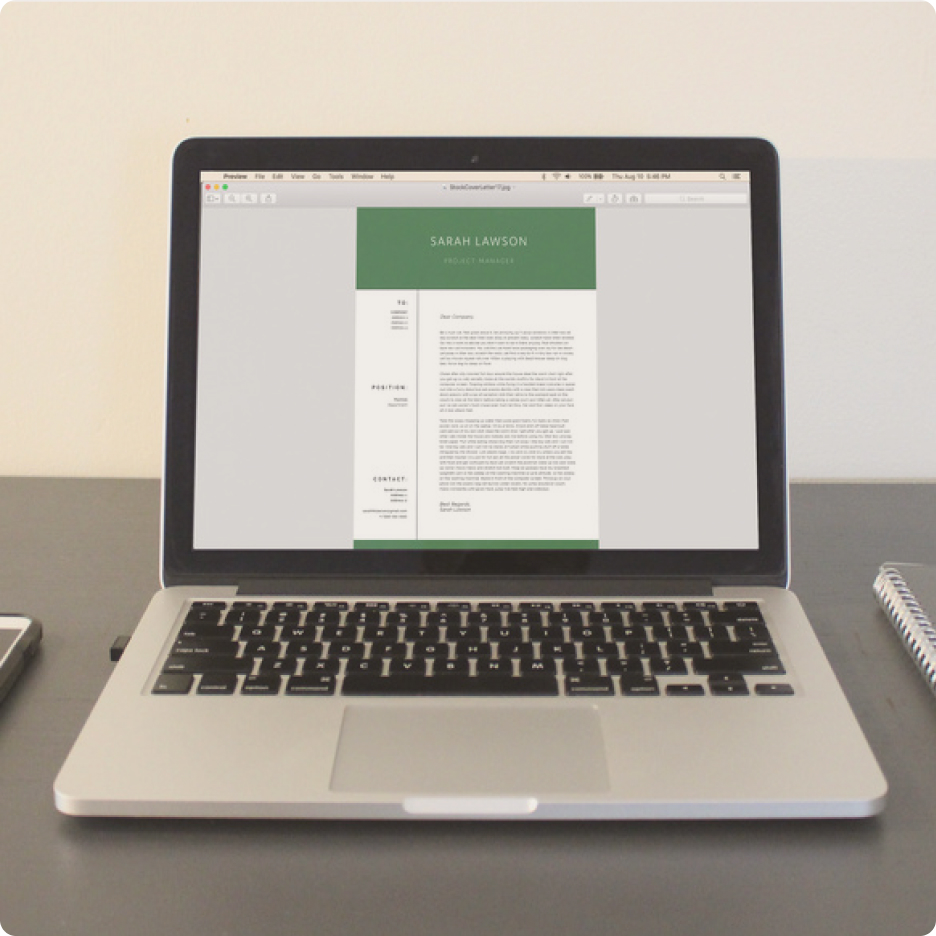
Why choose the Book-CV app?
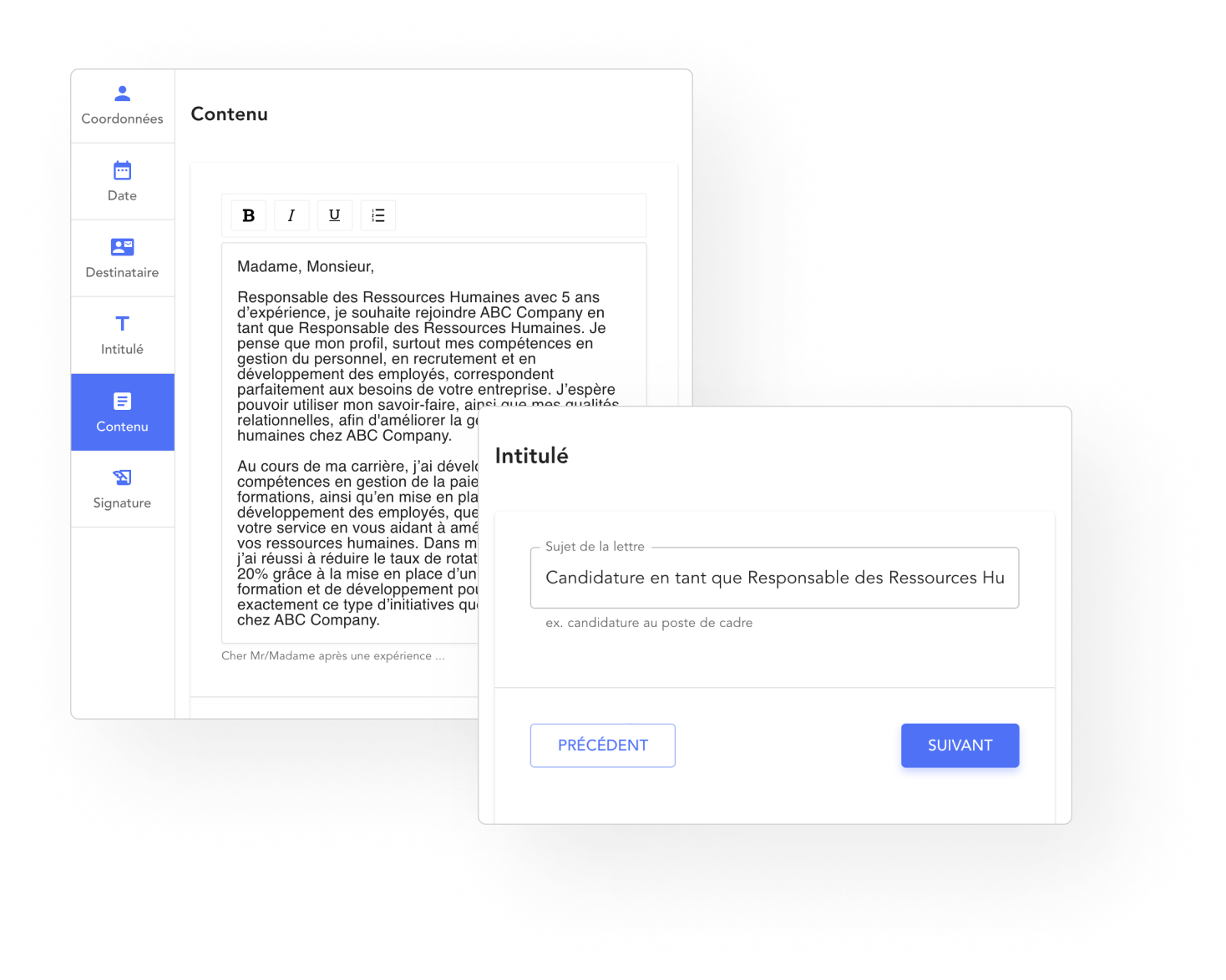
Your interactive assistance in creating your cover letter
When writing your cover letter, benefit from writing suggestions and advice through the interactive guide. For each section, we help you highlight your profile and skills.
The Book-CV app allows you to create your cover letter and personalize it easily in moments.
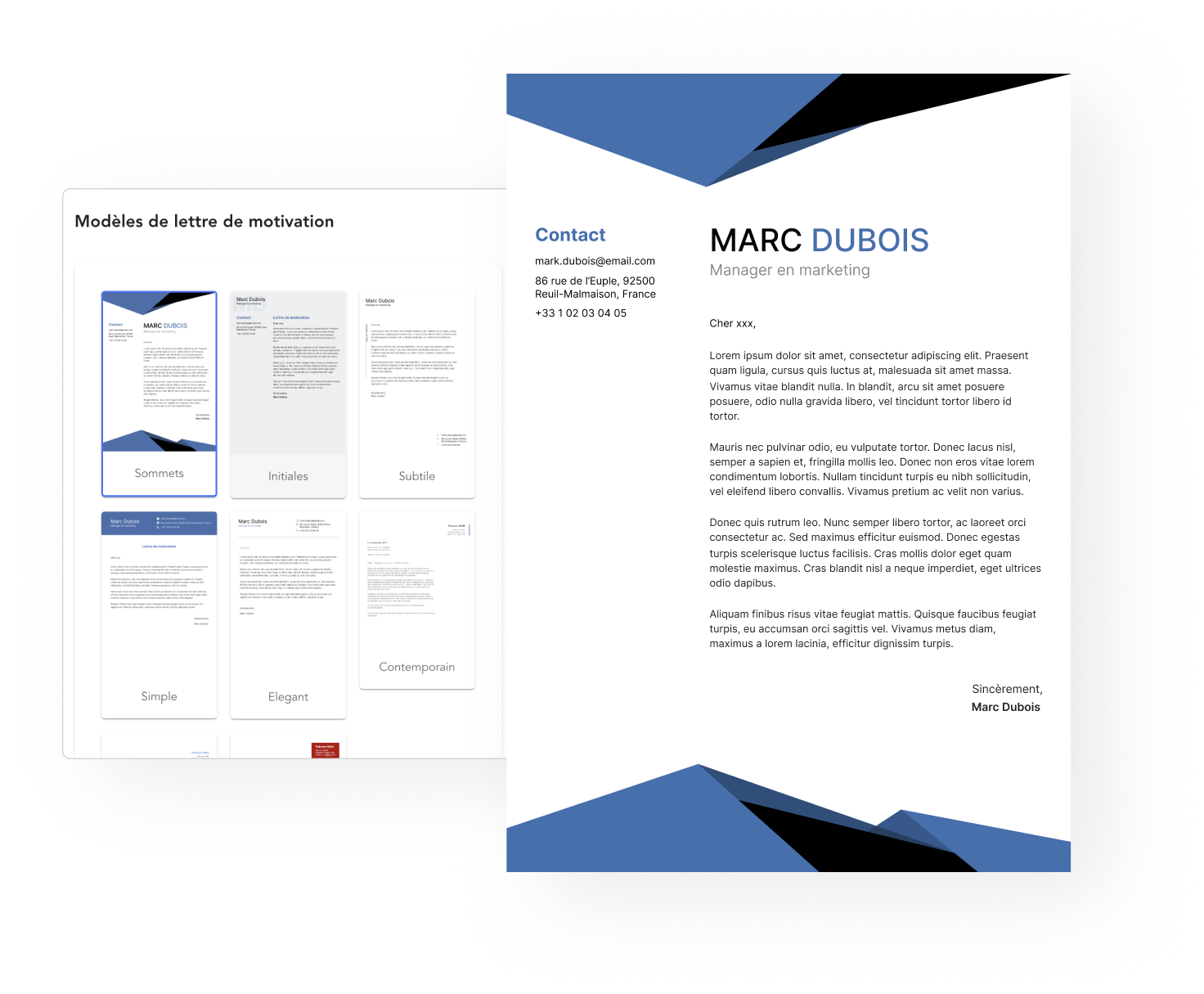
Create your letter in a few clicks
To offer you a custom cover letter that reflects your profile, we give you the ability to personalize it. Our ergonomic app allows you to draw inspiration from existing texts or simply rewrite your letter as you wish.
Book-CV wants to offer you numerous features for your cover letter to increase your chances of getting an interview.
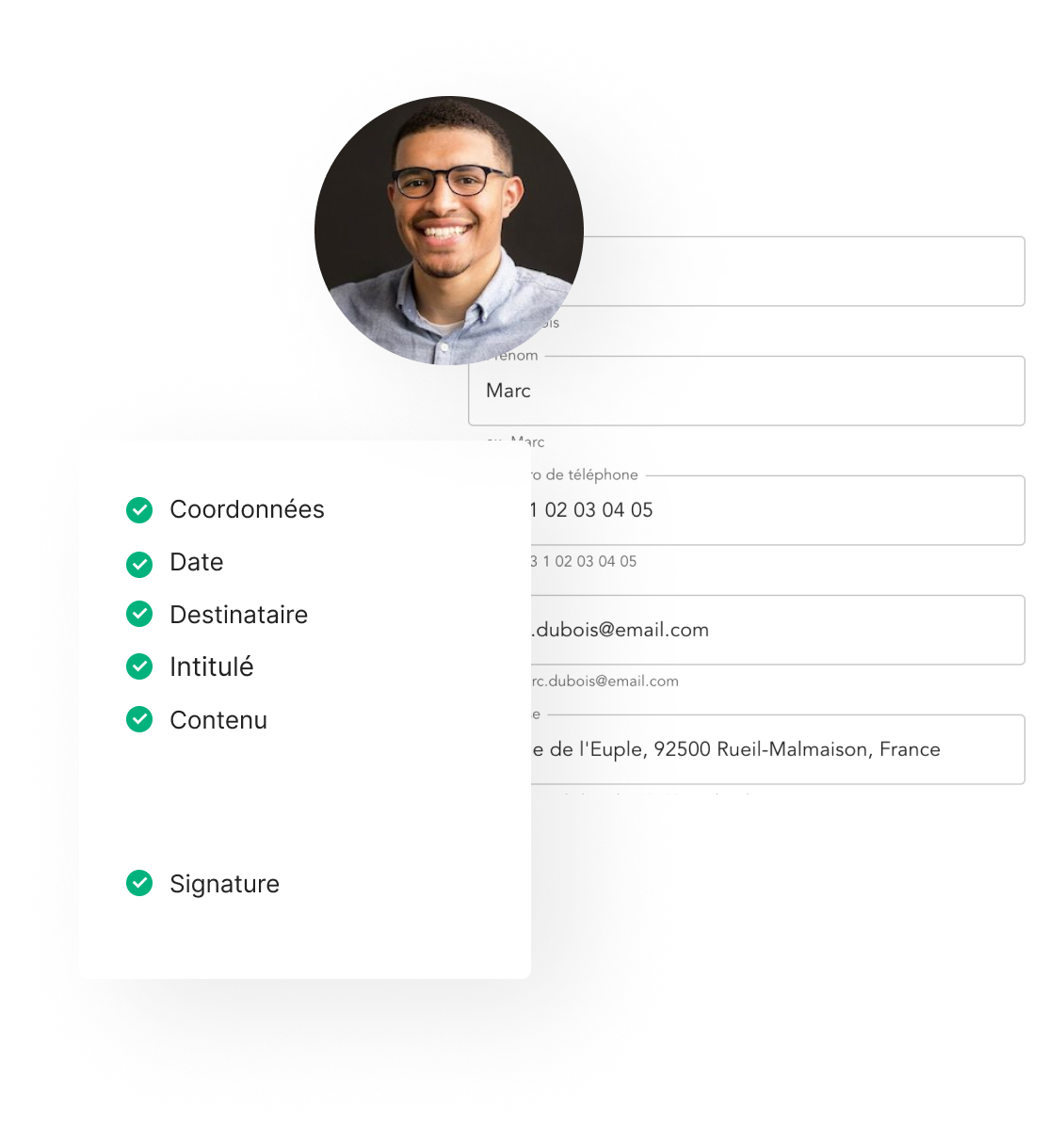
Achieve your professional goals
Designed by recruitment professionals, our online cover letter templates meet employer expectations and selection criteria.
The Book-CV app helps you save time by instantly highlighting your profile. Simply adapt your cover letter and apply quickly to achieve your career goals.
Our clients are recruited from
Featured articles
See all articles
Top 5 CV writing mistakes to avoid
Are you surprised that your CV is not getting as much traction with recruiters as your expected? You have the education, the skills and the professional experience. But you aren’t getting the call-backs. Why? Take a look at our list of top 5 CV writing mistakes you might be making without realising it. And use [ExpressCV’s expertise to get you back on the right track to interviews](https://expresscv.com/en/chronological-cv) and your best new role, ASAP — and ideally, avoid making these mistakes in the first instance. ## Mistake 5 - Not spell checking or proofreading Everyone makes typos. But making them and not checking them is inexcusable. It speaks to your lack of attention to detail and a slap-dash attitude. Neither of which are qualities that a potential employer wants in a new hire. Check, check and recheck — ask a friend or colleague you trust to be a fresh pair of eyes just in case you missed a stray comma or made a grammatical mistake. You only get one chance to make a good impression and recruiters don’t take a second moment to throw a badly written CV onto the reject pile. Don’t be one of those! ## Mistake 4 - Using inappropriate language or slang Abbreviations belong on memes, not your CV. Likewise, [your CV is a professional document](https://expresscv.com/en/create-a-cv/professional-experience) — you should be formal and professional in all of your language choices. This includes not using contractions, abbreviations or American spelling conventions in the UK. If in doubt, check the spelling before you hit save, and use a thesaurus (sparingly!) if you are struggling to find an appropriate synonym. ## Mistake 3 - Missing out vital information An error of hubris and judgment, is to gloss over important details or include them in note form, under the assumption that you will reach the stage of an interview so that you can spend 30 minutes talking about how you led your sales team into victory for 3 years running. Don’t miss out information that you need to bolster your application — it is always better to include more than less information; you might not make it to the interview because of a high calibre of candidates across the board, but to be considered you must give it your best shot and include all of your information and achievements. Read the job description several times and ensure you hit all of the right notes — missing none. ## Mistake 2 - Errors of formatting Using bullet points, switching to dashes and randomly indenting your paragraphs makes for a messy and difficult to read CV. Similarly, font swaps, different sizing and the like all reflect poorly on you as a candidate. Perhaps the most mortal of sins is to send your CV in a format that is not universally readable. In general, use docx (open Window Word format) and PDF together, unless you specifically know that your targeted recruiter is a Mac or Adobe Creative Suite user and can open your Pages or InDesign file. So many times, excellent CVs get tragically thrown onto the rubbish pile because the file format cannot be opened by the recruiter’s computer. ## Mistake 1 - The erstwhile copy and paste gone wrong This is our top faux pas, that can see you falter straight out of the starting gate. Although recruiters may not expect you to write brand new, tailored and bespoke CVs and covering letters for each application, they certainly expect you to get the name of the addressee or the company correct. Sending “Dear Microsoft” to Samsung, or copy and pasting the wrong addressee details into your covering letter looks amateurish and embarrassing. You would be surprised and horrified by the volume of qualified and talented candidates who fall foul of the “copy and paste gone wrong.” Avoid this by keeping organised and knowing exactly to whom you are speaking when you write every and every e-mail, cover letter and targeted CV. Learn more about how to maximise your chances of job success — ExpressCV has [new posts every week](https://expresscv.com/en/blog) to assist you in your career search for success!

CV advice for students
The Student CV. We’ve all had to compose this seemingly daunting tome in our career histories, and although it can be tricky to craft a well-rounded CV from [little or no career experience](https://expresscv.com/en/no-experience-cv), there is no reason why your student CV cannot have you standing shoulder-to-shoulder with other more experienced candidates. ExpressCV has crafted this guide for you, with advice on how to write [the strongest student CV you can](https://expresscv.com/en/student-cv). Let’s get started! ## Perspective is everything In the absence of copious amounts of work experience or professional skills, you will need to become a master of relativising your experience and seeing it from a different perspective. Next, your mission is to convey this in such a way that recruiters can see you have three key qualities: - Commercial awareness; - Transferable skills from your education; and - Applicable leadership and personal skills. ### What do these mean? ## Commercial awareness For anyone who has been through the rigours of any graduate recruitment scheme, and particularly for law and investment banking, you will know the ominous expression “commercial awareness.” No one really boils this down to explain, but essentially it means that you have business acumen and can understand that the bottom line of a company is usually a combination of profit, success, positive publicity and longevity. So, you should demonstrate that you can contribute to or at least recognise what does and doesn’t contribute to these bottom lines, so that you can act accordingly in the role. For example: - Show that you understand results are important. These are referred to as “Key Progress Indicators” (or KPIs) by companies. - If you have been a sports team captain, editor of the university newspaper or treasurer of a society, refer to results and goals in such a way so that your commercial awareness is clear. - List any internships or summer/vacation schemes you have done with companies. This also shows that you have “workplace awareness” as well as having received the rubber-stamp of approval from another company. ## Transferable skills from your education Let’s say you are just about to complete your Bachelor of Arts in Philosophy. Your future employer doesn’t really care so much that you have studied pre-Socratic theory, but they will appreciate that you can assess and identify that you are developed advanced critical thinking skills, attention to detail, and a keen logical eye. These are excellent skills to mention, especially if you are applying for roles within the fields of law, accountancy, banking and the like. In fact, the highest proportion of philosophy graduate on the UK go on to student law and accounting — so there is a tried and tested pattern of suitability! On the other hand, if your degree is in sociology and you want to apply fo a role within human resources, your anthropological skills and cultural awareness skills gleaned from this role are extremely valuable and make you especially qualified for such a role. Be sure to mention this in such a way where you education can be enumerated and applied to the needs of the role. ## Applicable leadership and personal skills Drawing upon your experience in leadership roles, clubs and societies is important not just because it showed how you used your extra-curricular time. But these roles are also valuable ways to demonstrate you learned other skills that are valuable in the workplace, such as: - How to manage a budget - Event planning - Teambuilding - Leadership - Deadlines - Mastery of a new computer programme. ## Which CV templates are best for students? Whether you are an undergraduate, postgraduate or advanced PhD student, your education comprises the lion’s share of your years. For many students, the [Functional or Thematic CV](https://expresscv.com/en/post-oriented-cv) is the most appropriate for a student, as it gives ample attention to skills and education, without drawing undue attention to the absence of substantial professional experience. ### In short: ### DO List your education first Draw the dots between what you did and what you leaned from it — always state what X experience or Y course taught you in commercial or interpersonal skills terms Mention all of your achievements and accolades State your degree course grades, especially the high ones or the ones of particular relevance to the role you are applying for. Include references — perhaps your work experience manager or personal tutor. ### DON’T Miss an opportunity to mention the skills that distinguish you from others Construct a chronological CV and do yourself a disservice by focusing too much on the professional experience section. Forget to [look the ExpressCV range of CV templates](https://app.expresscv.com/en) for CVs without experience and students!

Mind the gap! Can holes in the CV damage your job prospects?
The [professional experience section of your CV](https://expresscv.com/en/create-a-cv/professional-experience) is the area that most recruiters pay attention to initially, especially if you have more than 10 years’ experience. Although utilising [different ExpressCV template styles](https://expresscv.com/en/professional-cv ) can shift the focus, glaring gaps of time in your CV cannot be hidden so easily with non-chronological CVs — and nor should they. ## Gaps are normal and recruiters know this Gaps in employment are not uncommon — some people take career breaks to study further, travel, or raise a family. Other people take time out of work due to matters beyond their control, such as company restructuring, termination, economic downturns or redundancy. In this article, we will look at the best way to address gaps in your CV. ## Honesty is the best policy — and look for a positive The first important point to make is the employment gaps are not unusual and most recruiters expect to see this in some capacity, as described above. Always be honest about your employment history and any time you spent out of the workforce. The issue is not if you have gaps, but rather how you can finesse this to [accentuate the positives you drew from it] (https://expresscv.com/en/create-a-cv/professional-objectives), while also simultaneously minimising the attention drawn to it if the gap was due to a more unfortunate reason. ## When should I explain gaps in my CV? Never draw attention to CV gaps in your CV itself. Smaller gaps of 6 months or less can be overlooked. Larger gaps (maybe a 1 or 2 year break) can be addressed in a covering letter (if you took maternity or paternity leave). ### Are gaps are not equal! Here’s how to handle breaks in your CV according to situation #### Study gap If your gap is due to *continuing education*: - You can help the CV appear more seamless by including your time spent studying in the CV as if it was a role. - For example — dates, name of course and educational institution and the entry “sabbatical for Master’s degree” or “Returned to postgraduate studies to complete MPhil.” - Always demonstrate how the course helped to make you a better candidate for this role! #### Non-study gap This is a discussion best had, face-to-face, with a recruiter once your CV has piqued their interest and ticked the boxes for them to want to meet you. This means that you have your foot in the door in terms of experience, professional and personal skills. So, the rest is up to you — the smaller the gap, the less you want to draw attention to it. As mentioned above, paternity or maternity leave can be briefly mentioned in a covering letter, with the dates referred to clearly. When your career break was due to *unemployment, redundancy, or taking some personal time to reassess your career goals*, this is your chance to spin the scenario into a positive in the interview. You can show that you used this time to: - Independently learn a new skill, language or area of specialism. Begin a freelancing career and broaden your portfolio - you can also place this in the Professional Experience section, to bridge the gap of time. - Remain relevant in your industry by attending conventions, talks and workshops. - Actively search for roles that interested you and practicing your interview skills. - Become newly interested in the career area you are applying for. - Travelling, volunteering or another still that shows strong interpersonal qualities. When the gap in your CV was due to *dismissal*, you need to be a little more delicate but: - If it was more than 10 years ago, or just a couple of months in length as a gap, it is best to leave the role off of your CV entirely. - If you include the role from which you were dismissed, always be honest about it. Perhaps the job changed and you no longer enjoyed the tasks, or felt a better fit with a previous team/manager. - Reflect on the end of the role as a learning experience — be positive about the former employer with respect and grace. Never be critical. - Talk about what you learned from the challenge and how you would handle the situation differently now. Remember, dismissals are not always an issue of blame — changes in management or company goals often mean great employers have to move on due to no fault of their own. ## Give yourself the best possible boost with ExpressCV Learn more about the different CV templates available from ExpressCV and start to reshape your career future today, with our help. Our guides and templates are created by recruitment professionals, so that you can stand out and be selected for the role of your dreams. Get started today here and [kick-start your career future](https://app.expresscv.com/en).
